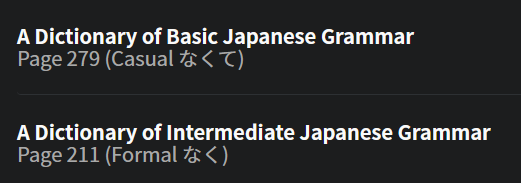English translation:
Aではなくて・じゃなくてB - not A, but B
Structure:
A + ではなく(て)・じゃなく(て) + B
では more formal than じゃ

English translation:
Aではなくて・じゃなくてB - not A, but B
Structure:
A + ではなく(て)・じゃなく(て) + B
では more formal than じゃ
I believe this grammar point is incorrectly linked to DBJG, p. 279. The grammar point covered there is 「〜なくて」 on its own which means “do not do ~ and ~” or 'is not ~ and ~".
The correct grammar point that should be linked is DIJG, p. 211. This grammar point is 「〜なく」 which means “not ~ and” or “not ~ but”.
Double checked both resources.
DBJG’s p.279 focuses on the ‘not x, so…’ while DIJB’s p.211 focuses on the Grammar Point that Bunpro talks about.
What I want to highlight here though is that both share the same basic meaning: ‘Not X, so…’. There’s also the fact that they mean the same thing, its just the Register that changes.
To better reflect that and add in your suggestion, I’ve updated the resources. Thank you!

Is there any difference between this and the ~なくて form of verbs and i-adjectives?
Referencing one of the examples:
事故を起こしたら逃げるのではなくて、警察に電話をしてください
事故を起こしたら逃げなくて、警察に電話をしてください
Is there any difference between the two?